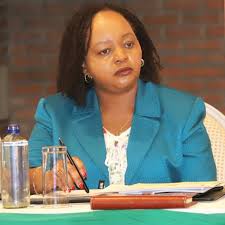By THE DISPATCH DIGITAL REPORTER
Tensions have surfaced within the Council of Governors (CoG) as reports emerged on Monday revealing deep division following the recent elections. Female governors were sidelined in the voting process, which resulted in a predominantly male leadership structure, raising concerns about gender representation.
Sources at the Safari Park Hotel, where the election took place, disclosed that several female county bosses staged a walkout after their calls for fair representation were ignored. The group had pushed for the candidacies of Homa Bay Governor Gladys Wanga and Machakos Governor Wavinya Ndeti to be considered for the position of Vice Chairperson. However, their proposals were dismissed by their male counterparts.
The walkout occurred just before the results were announced. One female governor reportedly whispered to her colleagues, encouraging them to leave in protest. The discontent among the female leaders became evident as they exited the room, their demands unmet.
Among the female governors in attendance were Nakuru Governor Susan Kihika, Kirinyaga Governor Anne Waiguru, along with Wanga and Ndeti, who had hoped to secure a more balanced leadership within the council. Their efforts, however, did not yield the desired outcome.
“If you look at the list of officials, only Wavinya Ndeti has secured a position, while the others are all male governors. They had submitted the names of Gladys Wanga and Wavinya Ndeti for the Vice Chairperson role, but this suggestion was rejected,” an insider, speaking anonymously, told reporters.
Chief Justice Martha Koome, who was present at the event, was said to have watched the developments with astonishment as the female governors made their exit. “They walked out, even with the Chief Justice in attendance. However, Anne Waiguru remained as it was her event,” the source added.
The election process itself was delayed due to disagreements over the voting criteria. A stalemate of over five hours ensued before the governors finally agreed on a secret ballot to elect the new CoG chairperson.
The walkout by the female governors is likely to deepen the rift within the council, as their frustration with being sidelined becomes increasingly apparent. Previously, the female leaders had hinted at plans to expand their G7 Women Governors Caucus to include half of the country’s gubernatorial positions, aiming to rename the group to G24.
Despite these efforts, only Wavinya Ndeti managed to secure a place in the CoG leadership, being elected as the chairperson of the Trade Committee. The rest of the leadership roles were filled by male governors, sparking concerns about the lack of gender balance within the CoG.
-
Sale!

CURING HYPERTENSION: Simple Healing Secrets Revealed
Original price was: $14.00.$5.00Current price is: $5.00. Add to basket -
Sale!

Diabetes Reversal: Stop Medication and Live Worry-Free For Life
Original price was: $14.00.$3.60Current price is: $3.60. Add to basket -
Sale!

The Rise of the Silent
Original price was: $5.00.$2.00Current price is: $2.00. Add to basket -
Sale!

Win Back Your Financial Freedom: A Guide to Build Your Wealth
Original price was: $5.00.$2.00Current price is: $2.00. Add to basket
New CoG Leadership
- Chairperson: Ahmed Abdulahi (Wajir)
- Vice Chairperson: Mutahi Kahiga (Nyeri)
- Chief Whip: Stephen Sang’ (Nandi)
- Health Committee Chairperson: Muthomi Njuki (Tharaka Nithi)
- Agriculture Committee Chairperson: Kenneth Lusaka (Bungoma)
- Legal Committee Chairperson: Ochilo Ayako (Migori)
- Finance Committee Chairperson: Fernandes Barasa (Kakamega)
- Environment Committee Chairperson: Wilber Otichilo (Vihiga)
- Arid and Semi-Arid Committee Chairperson: Nathif Jamah (Garissa)
- Blue Economy Committee Chairperson: Paul Otuoma (Busia)
- Education Committee Chairperson: Eric Mutai (Kericho)
- Gender Committee Chairperson: Simon Kachapin (West Pokot)
- Human Resource Committee Chairperson: Johnson Sakaja (Nairobi)
- ICT Committee Chairperson: Wesley Rotich (Elgeyo Marakwet)
- Lands and Housing Committee Chairperson: Anyang’ Nyong’o (Kisumu)
- Resource Mobilisation Committee Chairperson: Simba Arati (Kisii)
- Security Committee Chairperson: Benjamin Cheboi (Baringo)
- Tourism Committee Chairperson: Ntutu Patrick (Narok)
- Trade Committee Chairperson: Wavinya Ndeti (Machakos)
- Transport Committee Chairperson: Mohammud Ali (Marsabit)
- Water Committee Chairperson: Irungu Joshua (Laikipia)
The results have sparked debate about the future of gender representation within Kenya’s political leadership, with many hoping for greater inclusion in future elections.
-
Sale!

CURING HYPERTENSION: Simple Healing Secrets Revealed
Original price was: $14.00.$5.00Current price is: $5.00. Add to basket -
Sale!

Diabetes Reversal: Stop Medication and Live Worry-Free For Life
Original price was: $14.00.$3.60Current price is: $3.60. Add to basket -
Sale!

The Rise of the Silent
Original price was: $5.00.$2.00Current price is: $2.00. Add to basket -
Sale!

Win Back Your Financial Freedom: A Guide to Build Your Wealth
Original price was: $5.00.$2.00Current price is: $2.00. Add to basket




